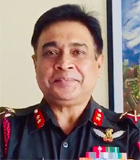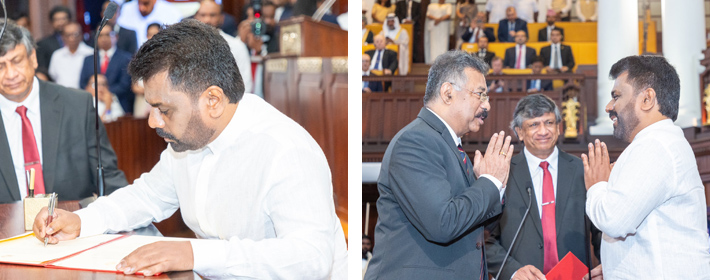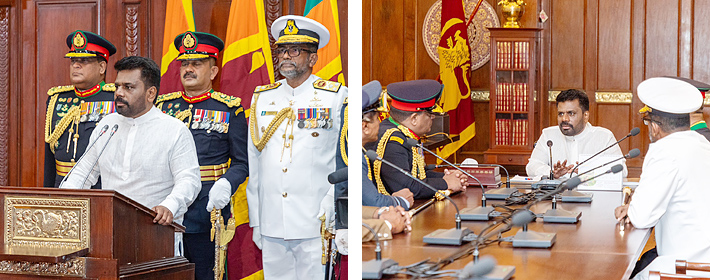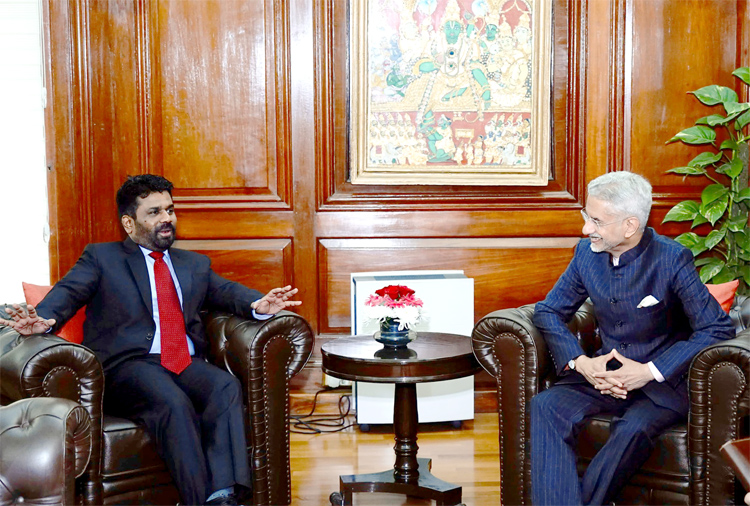INDIAN ARMED FORCES CHIEFS ON OUR RELENTLESS AND FOCUSED PUBLISHING EFFORTS

The insightful articles, inspiring narrations and analytical perspectives presented by the Editorial Team, establish an alluring connect with the reader. My compliments and best wishes to SP Guide Publications.

"Over the past 60 years, the growth of SP Guide Publications has mirrored the rising stature of Indian Navy. Its well-researched and informative magazines on Defence and Aerospace sector have served to shape an educated opinion of our military personnel, policy makers and the public alike. I wish SP's Publication team continued success, fair winds and following seas in all future endeavour!"

Since, its inception in 1964, SP Guide Publications has consistently demonstrated commitment to high-quality journalism in the aerospace and defence sectors, earning a well-deserved reputation as Asia's largest media house in this domain. I wish SP Guide Publications continued success in its pursuit of excellence.
- MoD initiates comprehensive review of Defence Acquisition Procedure 2020, pushes for defence reforms
- G7: The Swansong
- Kalinga Connect: South Asia to Polynesia
- Advanced MRSAM for India for a greater firepower
- Must Credit DRDO for Operation Sindoor, now what is next for defence R&D?
- Operation Sindoor | Day 2 DGMOs Briefing
- Operation Sindoor: Resolute yet Restrained
Sri Lanka Turns a Page
Anura Kumara Dissanayake, leader of the Janatha Vimukti Peramuna (JVP) - a Marxist political party, was elected as Sri Lanka's new President, with policy pledges of tough anti-corruption measures, bigger welfare schemes and slashing taxes
 |
The Author is former Chief of Staff of a frontline Corps in the North East and a former helicopter pilot. He earlier headed the China & neighbourhood desk at the Defence Intelligence Agency. He retired in July 2020 and held the appointment of Addl DG Information Systems at Army HQ. |


In the Defence Services Staff College, Wellington, Nilgiris (TN), the foreign military officers attending the prestigious staff course are required to give a country presentation, introducing us to their culture, customs and traditions, their government and their society. It was during one such event in 1995 that Lt Col S.L. Seneviratne of the Sri Lanka Army opened his talk saying that his ancestors came from Kalinga. I had sat up, intrigued. What kind of history did we read that while I didn't have the faintest idea my ancestors sailed to Sinhala and set up a kingdom there centuries back, the present day military officer from Sri Lanka was proudly claiming his ancestry!
Mass protests led to President Gotabaya Rajapaksa fleeing the country in July 2022, while Prime Minister Ranil Wickremesinghe stayed and negotiated a $2.9 billion IMF bailout
Since then I have had a soft corner for Sri Lanka. They are my relatives, going back two millennia. I have keenly followed the island nation's trysts with destiny as they grappled with terrorism for decades to come out of it in 2009 when the LTTE supremo Velupillai Prabhakaran was killed, closing a bloody chapter.
The Rajapaksa Era and Economic Collapse
Riding on this success in the battlefield, the Rajapaksas ruled the roost for the better part of the last two decades, first under Mahinda and then under Gotabaya. Till unbridled Chinese debt to fund vanity projects like the Mattala Rajapaksa International airport, nicknamed the 'Emptiest Airport in the World' combined with tourism disruptions due to COVID pandemic and a senseless decision to go whole hog for organic farming primarily to save precious foreign exchange on fertilizer imports upped the ante.
Mass protests led to President Gotabaya Rajapaksa to flee the country in July 2022. His willy Prime Minister, Ranil Wickremesinghe stayed put, going on to be elected by the parliamentarians as interim President and negotiate a $2.9 billion IMF bailout. The Indian government played the good neighbour to perfection, assisting with over $4 billion in order to ride out of the crisis.
No doubt the economy has stabilised, with inflation coming down from a record 70 per cent in 2022 to under five per cent today, but stringent austerity measures hurt the poor the most
Ranil Wickremesinghe was considered as the experienced hand having been Prime Minister a record six times and was sorely needed for negotiating the bailout. No doubt the economy has stabilised, with inflation coming down from a record 70 per cent in 2022 to under five per cent today. But the IMF bailout came with stringent austerity measures including removal of subsidies. To shore up revenues, VAT was hiked from eight per cent before the crisis to 18 per cent today. That hurt the poor the most. Electricity tariffs were hiked 75 per cent in August 2022 followed by another 66 per cent in February 2023 and 18 per cent in end of the year. As a result, over 2,500 small industries closed shop. Poverty levels have shot up from 11 per cent of the population in 2019 to 26 per cent today.

The Rise of Anura Kumara Dissanayake
Many in Sri Lanka blame Rajapaksas and his acolytes including Ranil Wickremesinghe for the country's worsening situation, with shortages of basic goods such as fuel and food impacting everyday life. Scores of rural hospitals have closed down. The anger in the streets, simmering since the last two years found expression in the Presidential election held on Saturday. Anura Kumara Dissanayake, leader of the Janatha Vimukti Peramuna (JVP) - a Marxist political party has been elected as Sri Lanka's new President and took oath on Monday, promising to renegotiate the IMF bailout package.
During campaigning, Dissanayake pitched himself as the underdog, out to oust the establishment parties led by Ranil Wickremesinghe and Sajith Premadasa and usher in a pro-poor administration. "Politicians who promised to stop corruption have engaged in corruption; those who promised to create a debt-free Sri Lanka have only worsened the debt burden; people who promised to strengthen the law have broken it" he had exhorted. Among Dissanayake's policy pledges are tough anti-corruption measures, bigger welfare schemes and a promise to slash taxes.
The Indian government assisted Sri Lanka with over $4 billion to help navigate the economic crisis, playing the role of a good neighbour
The Indian foreign policy establishment would be on tenterhooks though. Both Ranil and Sajith were considered friends of India. Dissanayake is a different kettle of fish as is his party, the JVP. But we may have bought some insurance having invited him to visit New Delhi in February this year wherein he had meetings with Foreign Minister Jaishankar and the NSA Ajit Doval. Dissanayake hasn't spewed venom against India unlike President Muizzu of Maldives who despite his anti-India campaign has possibly come around to understand the realities of geopolitics in this hemisphere.
Dissanayake has assured that he will tread carefully and consult the IMF on the way forward so as not to adversely impact on fiscal targets and disrupt Sri Lanka's road to recovery. The Indian Ambassador to the island nation Santosh Jha was the first diplomat to congratulate Dissanayake on his stupendous victory.
A Hope for the Future
As I began this column invoking the ancient connections of Kalinga with the Lankans, we may find it useful to re-energise those sentiments. The Kingdom was founded by a Prince from Kalinga named Vijaya, son of King Sinhabahu. Durga's lion and the worship of Narasingha in Odisha are directly linked to the lion on the Sri Lankan flag. The Dathavamsa, a Buddhist work of the third century, mentions that Dantakumara, a Prince of Ujjain married Hemamala the daughter of King Guhasiva of Kalinga and received from him the tooth relic of Gautama Buddha as dowry. Dantakumara then took the sacred relic to Ceylon where it is now enshrined in Sri Dalada Maligawa Temple, a stupa in Kandy.
I haven't been to Sri Lanka, having missed a golden opportunity in 1986 when the Indian Army was put on high alert impending deployment to Sri Lanka. I was posted with my Artillery Regiment on the outskirts of Coimbatore. With Sulur Air Force base identified as a staging airfield, we were ideally placed for rapid induction. However, the deployment got delayed and in April, 1986, I had to leave the unit to join flying training at the Air Force Academy, Hyderabad. Eventually I would train to become a helicopter pilot while my Regiment fought an intense insurgency operation in the jungles of Vavuniya.
Today Sri Lanka turns a page with President Dissanayake at the helm. India will hope that the old wounds of Tamil-Sinhala divide will be given a burial by honestly implementing the devolution of powers as outlined in the 13th Amendment to Sri Lanka's constitution passed in 1987 as part of India-Lanka Agreement. India will also hope to partner Sri Lanka in its ride out of choppy waters. Kalinga may be a useful link in this endeavour.





